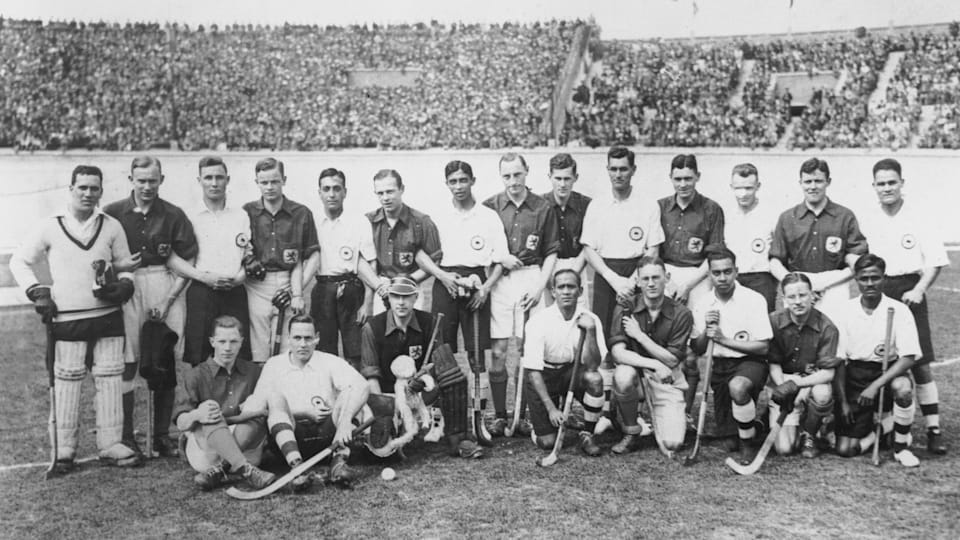India men’s hockey and their love affair with Olympic gold
In the history of the Olympic Games a number of teams have reached such heights that it can only be described as incredible. Tokyo 2020 revisits the stories of these unforgettable teams and the star players that helped them light up the Olympic Games. In the latest part of our series, we take a look at how India's men’s hockey team dominated the Olympics during their golden period.

How it all started
It was almost a century ago (93 years to be precise) when the Indian men’s hockey team first participated at an Olympic Games, as they took to the field at Amsterdam 1928.
The country's Hockey Association was formed three years earlier and the team took the world by surprise when they won their maiden Olympic gold - beating teams in their group by convincing margins (Austria 6-0, Belgium 9-0 and Switzerland 5-0) before overcoming the hosts Netherlands, 3-0, in the final.
Under the leadership of Jaipal Singh Munda, India not only stamped their authority on the discipline - they claimed gold without conceding a single goal in the tournament - but laid the foundation for a legacy that lasted for years.
Gold medals and gold medals…
What followed cemented their place in the history books.
Four years later, at the Los Angeles 1932 Games, the team defended their gold medal with simply breathtaking performances.
Dhyan Chand, one of the world's greatest hockey players, hit peak form during the Games and helped his team secure a stunning 24-1 win against the hosts. The result still stands as the largest margin of victory in men’s field hockey at the Olympics.
Chand scored eight goals in the match while another Indian star, Roop Singh, sent the cork ball flying into the net 10 times.
History repeated itself at the Berlin Games in 1936 where Chand took over the captaincy. Big wins over Japan (9-0) and USA (7-0) helped India storm into the final where they faced the hosts.
India thrashed Germany 8-1 - with the one goal being the only goal they conceded throughout the whole tournament.
The goal difference remains the largest margin of victory in the final of the Olympics to date, and helped India secure a third successive gold medal.
Come the 50s, the gold medal streak continues
The Second World War meant there was a 12-year delay to the next edition of the Olympic Games, but the script didn't change for India as they took to the field at London 1948.
Under the tutelage of Kishan Lal, India made an impressive start beating Austria 8-0, Argentina 9-1 and Spain 2-0. High on confidence, the team reached yet another final where they took on Great Britain (who won gold in 1908 and 1920) on their home soil.
The clash was tipped by many to be a close contest, but it turned out to be anything but. The world witnessed another one-sided final and saw India thrash their hosts 4-0 to claim their fourth Olympic gold.
The winning streak didn't stop there.
At the Helsinki 1952 Games, India defeated the Netherlands 6-1 in the final, where Balbir Singh Sr. - another hero of Indian hockey - scored five goals, a record that stands to date.
Meanwhile, at the Melbourne 1956 Games, India registered some of the biggest wins in the group stages in Olympic history: beating Afghanistan 14-0 and the USA 16-0. They defeated Germany in the semi-final and faced Pakistan in the final, where they claimed gold by netting a solitary goal.
The team were simply head and shoulders above every side and had amassed a staggering six successive gold medals.
What happened after?
Though India enjoyed glittering success for almost three decades, their 30-match unbeaten streak came to an end at Rome 1960 with a 1-0 loss to Pakistan and they were forced to settle for silver for the first time in 32 years.
Headlines were also made at the 1962 Asian Games, where they were defeated by Pakistan in the final again, this time with a 2-0 scoreline.
However, redemption came quickly at Tokyo 1964 as they made an emphatic return - beating Hong Kong, Belgium, the Netherlands, Malaysia and Canada in the group stages before beating Australia 3-1 in the semis and taking revenge of their 1960 final loss against Pakistan by beating them in the finals (1-0).
Though the high-flying Indian team won two successive bronze medals at Mexico 1968 and Munich 1972, the team last won gold at the Moscow 1980 Games.
Since then, India’s best record has been the fifth-placed finish at the Los Angeles Games in 1984.
However, with a strong side under the captaincy of Manpreet Singh, could they spring a surprise in Tokyo?
Only time will tell…
